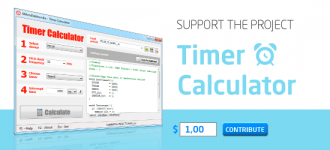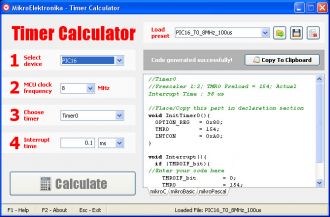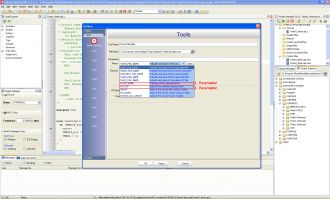
We strongly encourage users to use Package manager for sharing their code on Libstock website, because it boosts your efficiency and leaves the end user with no room for error. [more info]

Rating:
Author: MIKROE
Last Updated: 2016-07-19
Package Version: 4.0.0.0
Category: Timers (Real time clock)
Downloaded: 142130 times
Followed by: 18 users
License: MIT license
Timer Calculator is a free software development tool used for easier calculation of timer interrupts. If you like Timer Calculator you can support further development by contributing on following page: http://www.mikroe.com/timer-calculator/#support
Do you want to subscribe in order to receive notifications regarding "Timer Calculator" changes.
Do you want to unsubscribe in order to stop receiving notifications regarding "Timer Calculator" changes.
Do you want to report abuse regarding "Timer Calculator".
| DOWNLOAD LINK | RELATED COMPILER | CONTAINS |
|---|---|---|
| 1468924105_timer_calculator_other_other.zip [1.79MB] | Other Compiler |
|

You can give us a heads up by contributing a small piece of the price. Pay a dollar, three or ten, all depending on how much you think this software is valuable to you.
View full imageTimer Calculator is a product of our enthusiasm, released as a free tool. But adding new features and supporting new MCUs requires lots of work. If you like it and use it in your projects, you can support further development by paying only as much as you think this software is worth. Thank you!
Overview
Timer Calculator is a software development tool used for easier calculation of timer interrupts. This software also generates source code compatible with mikroElektronika Compilers (mikroC, mikroPascal and mikroBasic) and for following MCU architectures: PIC16, PIC18, dsPIC30F, dsPIC24/33, PIC32, ARM Stellaris/TIVA, ARM STM32, AVR, FT90x and NXP Kinetis K.

Features - Timer Calculator is very easy to use and have user friendly oriented IDE.
- Support for the following microcontroller architectures: PIC16, PIC18, dsPIC30F, dsPIC24/33, PIC32, ARM Stellaris/TIVA, ARM STM32, AVR, FT90x and NXP Kinetis K.
- Timer Calculator generates source code for mikroC, mikroBasic and mikroPascal compilers.
- Many predefined settings to load for timer interrupt time.
- Save/Load feature.
- Easy to integrate as a tool in mikroElektronika's compilers. In this mode Timer Calculator will automatically insert a chip name and frequency from your project (for more information see help below).
New Version (4.0.0.0)
- Added: Support for STM32F7x6, STM32L0xx, STM32L4x6, CEC1302, Kinetis K
- Presets for new mcu families
- Added APBx prescalers for STM32 families
- Fixed: Bad comments for PIC32MZ when using 32bit timer in Pascal and Basic languages
- Fixed: Bad IVT names for timers in STM32 Families
Version (3.5.0.0)
- Added: Support for PIC32MZ EC mcus.
- Automatic save/load when exiting/starting application.
- Minor changes in generated code output for PIC32MX mcus.
- Minor bugs fixed.
Version (3.0.0.0)
- Added: Support for new FT90x mcus.
- Fixed calculation for PIC32 in 32bit mode.
Version (2.7.0.0)
- Added: Support for new TM4C129x (TIVA) mcus.
Version (2.6.0.0)
- Added: Support for new TM4C123 (TIVA) and STM32F0 mcus.
- Added: Presets for TM4C123 and STM32F0.- Fixed: Calculation for PIC18 Timer0.
- Fixed: Clock value when loading presets.
- Fixed: Closing About screen.
Version (2.5.1.0)
- Fixed bug in STM32F10x calculation.
- Fixed calculation for PIC16/18 (x4 off bug).
- Other minor bugs solved.
- New mcu categories for ATmega (use hint for select device box to see supported mcus).
- Max frequency is now 200MHz.
- Interrupt frequency implemented. User can change between interrupt time and interrupt frequency.
- Added new presets for ATmega mcus.
Version (2.5.0.0)
- Added support for AVR mcus.
- Added support for STM32F3xx mcus.
- Added new config files for new supported MCU architecture.
Version (2.0.0.0)
- Added support for ARM Stellaris and ARM STM32.
- Added new config files for new supported MCU architectures.
Version (1.5.0.0)
- Added support for dsPIC30F, dsPIC24/33 and PIC32.
- Minor changes in a generated code part.
- Added new config files for new supported MCU architectures.
Version (1.0.1.0)
- Bugs Fixed
- Deleted unnecessary initialization of PRx register in Interrupt routine.
- Fixed Regional Settings.
- Fixed bugs with calculate mechanism and values for prescaler.
Next images demonstrate how to implement Timer Calculator as a tool in mikroE IDEs.

Use F12 to open Options menu, select Tools. If you want to use your project settings in Timer Calculator, you need to insert %CHIP_NAME and %CLOCK into Parameters option.
View full image